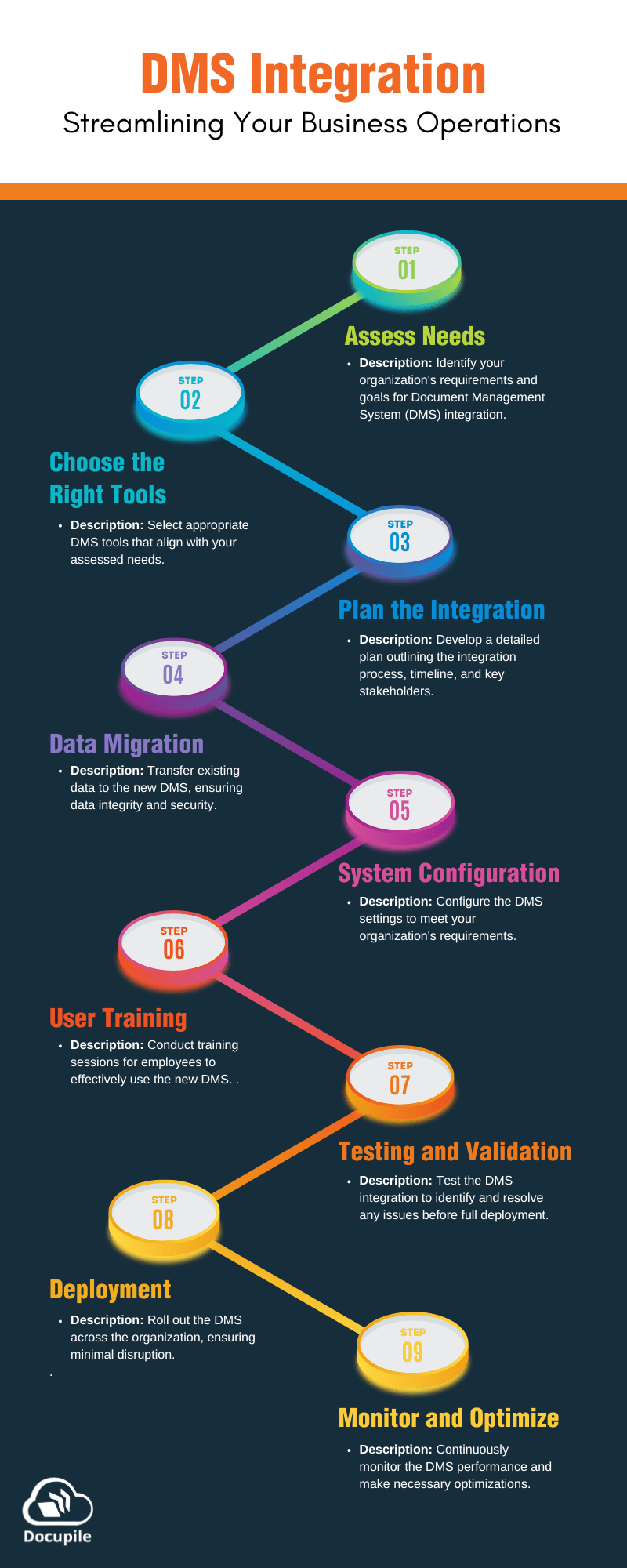Introduction
In today’s business environment, the integration of various software is important for business productivity. One such integration is DMS integration. After connecting DMS with ERP and CRM, companies can simplify processes to improve productivity. This blog will help you understand what the benefits of DMS integration are. Role of DMS in ERP and CRM, the steps of successful integration, and various other benefits.
Want to Learn More?
Check Out: How Electronic DMS for Accounting Firms Helps Accounting Team
At a Glance
DMS Streamlines Your Business Operations -Infographic!
What is DMS Integration

DMS integration is linking a document management system to other applications used in business such as Enterprise Resource planning tools and CRM systems. This helps share and update documents and information easily through different platforms. This creates a unified workflow automating the process of document sharing. The integration process ranges from simple data exchange to full automation.
Understanding ERP, CRM, and Document Management systems

Before we get into the nitty-gritty of DMS integration, let’s take a step back and meet the essential systems involved:
Role of DMS in ERP and CRM Systems
Integrating a DMS with ERP and CRM systems improves their working by providing central storage for all documents. This eases document access and management, leading to consistency and productivity.
For example, if a document is updated in the DMS, it’s automatically updated in both the ERP and CRM systems at the same time. This means no more hunting for the latest version – everyone is on the same page.
Moreover, DMS integration allows for document related tasks. For example, invoices that are generated by ERP systems can be automatically stored and shared. Customer contracts in CRM can also be stored in DMS. This provides the sales and legal team with easy access to documents.
Steps to successful DMS Integration
Achieving successful DMS integration requires careful planning and execution. Here are the key steps:
Benefits of DMS Integration with Other Business Applications

DMS integration offers several significant benefits for businesses:
Embracing the Future of Integrated DMS

The future of business success depends on smoothly connecting different software programs. As technology gets better, Document Management Systems (DMS), Enterprise Resource Planning (ERP), and Customer Relationship Management (CRM) systems will work together even more seamlessly. This will create even stronger solutions for businesses. By starting to integrate their DMS now, companies will be ready for future advancements and stay ahead of the competition in a market that’s constantly changing.
New technologies like artificial intelligence (AI) and machine learning are expected to make DMS integration even better. These technologies can automate more complicated tasks, like sorting documents into categories and taking information out of them. This will make managing documents even faster and more accurate. Plus, cloud-based DMS solutions offer more flexibility and access. This means employees can get the documents they need from any location, at any time.
Conclusion

Integrating a Document Management System (DMS) with your existing software can be a game-changer. Think of a DMS as a digital filing cabinet that keeps all your important documents organized and easy to find. By connecting your DMS to your Enterprise Resource Planning and Customer Relationship Management systems, you can unlock a world of benefits.
Here’s how it works: Imagine you’re working on a sales quote. With an integrated DMS, you can easily pull up customer information from your CRM and product details from your ERP, all within the same system. No more switching between programs or hunting for files! This translates to faster quote turnaround times, happier customers, and a smoother workflow.
But the advantages go beyond just sales. Integrating a DMS can improve efficiency across your entire organization. From managing contracts and invoices to collaborating on projects, a DMS can help your team get more done in less time. Plus, you’ll have peace of mind knowing your documents are secure and easily accessible.
FAQS






